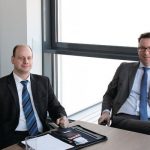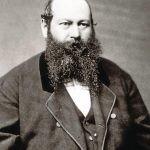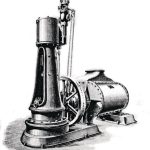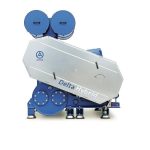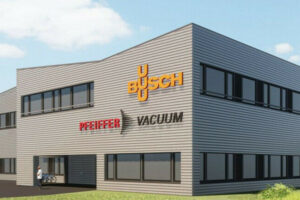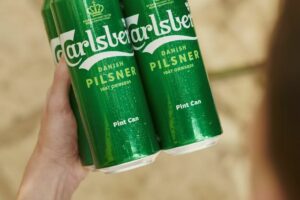Positive displacement blowers, screw compressors, turbo blowers and gas meters from Aerzener Maschinenfabrik have made the small town of Aerzen, situated in the Humme Valley in the Weser Uplands region of Germany, known all over the world. To mark an important anniversary, cpp visited this successful SME, which can look back on a century and a half of tradition.
Author Lukas Lehmann Assistant Editor-in-Chief
cpp: Aerzener Maschinenfabrik was founded in 1864. Mr. Heller, isn’t it a major challenge to lead such an old family business into the future?
Klaus-Hasso Heller: It is a challenge as well as an obligation. The challenge lies in ensuring that I can organise a company which has been led very successfully by my great-grandfather, grandfather and father and has a very good, solid financial foundation. Of course, I hope it will continue that way in future.
cpp: And what is the obligation?
Heller: It consists in a responsibility for the jobs of nearly 2000 employees worldwide. They expect me and the other managers to lead the company so that their jobs remain safe in future.
cpp: Mr. Heller, you have been CEO of the company since 2000. What are your plans for the next 150 years?
Heller: [laughs] First of all, our plans concentrate on the period until 2020. By then, we hope to nearly double our turnover from presently 320 to 580 million euros. This target is part of our vision for 2020. The other objectives defined in our strategy paper are to safeguard our technology leadership, complete the transition to an application specialist, extend our international network and focus consistently on the efficient use of energy – both as far as our products are concerned and in terms of our production processes.
cpp: Back to the roots of Aerzener Maschinenfabrik. Wilhelm Meyer founded the company in 1864. Only four years later, the first positive displacement machine of Continental Europe was brought on the market. What type of machine was it?
Heller: At that time, the company manufactured several different products – from agricultural machinery to cast-iron graveyard crosses. The positive displacement machines were only one product out of a very broad portfolio. They worked according to the Roots principle. Mr. Meyer brought the idea for these machines, which replaced the bellows in forges, back with him from England.
cpp: What did these machines look like? Were they already made completely of steel?
Heller: No, they were made of many wooden parts and cast on the inside with plaster. Leather straps were used for sealing. They looked like weird giants but at the time, they were very successful.
cpp: How did the industrialisation of Germany affect the development of Aerzener Maschinenfabrik during the second half of the 19th century?
Heller: Industrialisation enabled the original agricultural machinery manufacturer to break into new markets such as mining, heavy industry and chemicals. Ambitious, upcoming industrial firms required a lot of compressed air. This requirement was met with positive displacement machines from Aerzen. The increased demand for air as a result of the Industrial Revolution meant an enormous boost for our young company. The 5000th blower was shipped in 1897. In the same year Aerzen was connected to the railway network – another milestone that generated more new business.
Stephan Brand: Industrialisation led Aerzen to focus on industry and associated products, in other words blowers for a variety applications. Later on, pumps were also produced. At the beginning of the 20th century, Aerzen machines were supplied to almost all key sectors of industry. In 1909, the 10,000th positive displacement blower was delivered to Heinrich Koppers of Essen, a leading provider of coal refining plants.
cpp: During the First and Second World Wars your company manufactured war-relevant products. During the Second World War, for example, you made superchargers for Krupp submarines. Mr. Heller, this dark chapter in Aerzen’s history will also be mentioned in your commemorative brochure. Why did you decide to address this topic so openly?
Heller: Because it is part of my company’s history. It’s something we have to face up to whether we like it or not.
cpp: What happened after the Second World War?
Heller: In 1947, my grandfather Karlheinrich Heller returned to the company following a period in a British prisoner-of-war camp. The range of products was reduced and the production processes optimised by introducing standardised components. As you can see, we have already been manufacturing our blowers and screw compressors according to modular principles since 1950.
cpp: Ever since the fifties, your company has allowed its employees to participate in its success. Why was – and is – fair social interaction with the staff so important to your family?
Heller: Because our success would never have been possible without them. They form part of a large team, along with the shareholders and management, that needs to collaborate in an atmosphere of open-mindedness, motivation and mutual respect in order to succeed.
cpp: Does this policy of fairness also apply in times of crisis?
Heller: Yes, I think so. During the 2008/2009 recession we tried to keep all employees on board with short-time working. We gave them security and they helped us get off to a good start again after the recession was over.
cpp: In 1978, Aerzener Maschinenfabrik supplied the world’s largest positive displacement blower to a Soviet steelworks. This example shows how your company has a long tradition of international business relations.
Heller: That’s right. The German market soon became too small for our products. We were already shipping machines to China in the thirties and forties of the last century. It was during this period that our Italian subsidiary was established. The founding of Aerzen France in 1968 by my father Hasso Heller represented another important step in the company’s globalisation strategy. Sales companies followed in the UK, the Netherlands, Belgium, Spain, the USA and Canada.
cpp: How many subsidiary companies and production facilities do you have in the meantime?
Heller: The group comprises 42 sales and service companies, some of which also assemble plant. In addition, we have a production facility in South Korea where a special turbo blower with air foil bearings has been manufactured for the past three years or so. The fact that approximately 85 % of our machines are commissioned abroad shows how international our business has become.
cpp: Even though much of your business now takes place in other countries, your Aerzen site is still regularly expanded. You evidently intend to stay there in future. What advantages does Aerzen offer as a location?
Heller: 1100 staff who do a good job and are highly qualified and motivated.
cpp: Let’s turn to the products your company makes. Mr. Brand, which machines were decisive for the successful development of Aerzener Maschinenfabrik?
Brand: The positive displacement blowers pioneered by Aerzener Maschinenfabrik back in 1868. The turbo blowers that were added to our range of products in 1911. The screw compressors we developed together with a Swedish engineering consultant in 1943. It was these three machines that laid the foundation for today’s success. They are still the starting point for current product developments. The best example are the rotary lobe compressors in the Delta Hybrid series which we launched on the market in 2010. These machines are a symbiosis of positive displacement blowers and screw compressors. Their biggest advantage is that they require about 15 % less energy than conventional compressors. Outstanding energy efficiency is also a characteristic feature of our new turbo blowers, which were included in our portfolio in 2012 under the name Generation 5. An air foil bearing is used in these machines instead of the usual roller or slide bearings. They are also equipped with a permanent magnet motor.
cpp: Which developments will characterise the blower and compressor technology in future?
Brand: Our main development objective will be to further optimise the life cyclecosts. The continuous improvement of energy efficiency will be another important aspect, as will be maintenance costs. The latter will additionally be reduced by failsafe and durable machine concepts coupled with cost-efficient remote maintenance.
cpp-net.com/0214436
Focus on energy efficiency
Ifat news
The Delta Hybrid series has been extended yet again. The D152S series was shown at the Ifat international trade fair for water, sewage, waste and raw materials, which took place in Munich at the beginning of May. It has a capacity of approximately 150 m³/min at 250 to 355 kW driving power. The machines are used for wastewater treatment as well as in pneumatic bulk transport units. The exhibit also included new sizes of the company’s Generation 5 turbo blowers. As a special highlight, the E-blower – an energy-efficient version of the proven Delta Blower units – made its début. The E-blower requires between 3 and 4 % energy less energy than traditional Delta Blowers regardless of the motor used. Complementing the Delta Hybrid, the E-blowers are also available in the lower volume flow range from 3 to 15 m³/min. They, too, are mainly employed for wastewater treatment.
Share:



